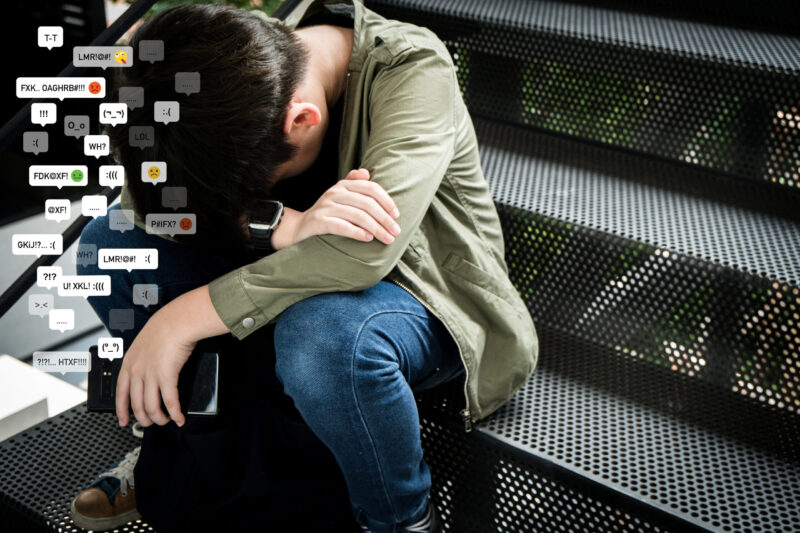cristina

A Deep Dive: The Role of Technology In Cyberbullying By Tech Expert, Lisa Chang
Whether at school or the workplace, we are reminded of the importance of standing against bullying in all forms. The conversation and raising awareness must continue. As technology evolves, so do the methods and consequences of online harassment, so it’s more important than ever before to understand cyberbullying inside and out. Here’s a full scope into where it’s happening, how it’s effecting our youth and, more importantly, what to do if it’s happening.
We are in a new era of bullying that needs close attention
I’m sure we can all agree that if we haven’t been the direct victim of cyberbullying, most (if not all of us) have witnessed it happening. For our teens, cyberbullying is now the main form of bullying and is considered even more difficult and challenging to deal with than traditional forms of bullying in school environments because access to a target is 24/7.
Here are some of the latest stats: (sourced from Dove Confidence Kit and Kids Help Phone)
- Over 8 in 10 youth mental health specialists say social media is fueling a mental health crisis
- 9 in 10 youth mental health specialists say the rise in mental health issues linked to social media is alarming
- 57% of CA young people are exposed to cyberbullying online
- 8 in 10 or more youth mental health specialists say that young people are addicted to social media
- 9 in 10 youth mental health specialists say that the amount of time young people are spending on social media is harming their health

So where is it happening? Social Media platforms of course!
Snapchat (69%)
Tiktok (64%)
IG/Facebook (49%)
So we asked Snapchat what they’re doing to protect our youth. Here’s what they said: “Snapchat was deliberately designed to be used with friends and people you know and care about, without the pressure to be perfect or popular. The private nature of the app makes it more difficult to be the target of online harm from strangers.
Dealing with and reporting bullying on Snapchat: If a Snapchatter is experiencing or witnessing bullying or inappropriate behavior, Snapchat encourages them to report it immediately, block the bully, and leave the group chat. Seek support from a trusted source and review your friend list regularly. It’s sometimes hard for parents to understand what happens on an app or the risks without actually being on it themselves. Snapchat has various parental guides and tips available for parents trying to navigate and learn more about the app. Last summer, in an effort to foster healthy and important conversations between users under 18 and their parents/guardians, Snapchat rolled out new in-app safety tools called ‘Family Center’. The goal was to give parents more insight into who their teens are communicating with on Snapchat while still respecting the teen’s privacy. Of course, both parent and teen have to agree to use the feature, but it allows parents to check in frequently to see who their teens are connecting with, which might provide an opportunity for parents to start conversations about online behaviors or any issues their teens may be facing online.”
There are 8 main types of cyberbullying:
- Cyberbullying harassment – sending a lot of messages to someone who doesn’t want to receive them.
- Cyberstalking – stalking someone’s online activity, including on social media
- Denigration – usually involves derogatory comments
- Happy slapping – filming embarrassing scenes to those who are filmed, and subsequent distribution of such videos.
- Exclusion – purposeful exclusion of certain members from online groups.
- Outing and trickery – deceiving the victim to gain sensitive personal information.
- Impersonation and masquerading – posing as someone else online
- Indirect threat – involves the threat of physical harm
What are teens being bullied about?
61% – Appearance
25% – academic achievement/Intelligence
17% – race
15% – sexuality
15% – financial status
Advice for the Teens: 65% of teens believe that if they just wait it out, the cyberbullying will go away on it’s own – THAT’S NOT THE CASE.
So how do you tell the difference between an online joke and bullying?
- All friends joke around with each other, but sometimes it’s hard to tell if someone is just having fun or trying to hurt you, especially online. Sometimes they’ll laugh it off with a “just kidding,” or “don’t take it so seriously.”
- But the joke has gone too far if you feel hurt or think others are laughing at you instead of with you.
- If it continues even after you’ve asked the person to stop and you still feel upset about it, this could be bullying.
- When bullying takes place online, it can result in unwanted attention from a wide range of people including strangers. Wherever it may happen, if you are not happy about it, you should not have to stand for it.
- Stopping cyberbullying is not just about calling out bullies, it’s also about recognizing that everyone deserves respect – online and in real life
- What are the effects of cyberbullying? When bullying and harassment happens online it can feel as if you’re being attacked everywhere, and can make it hard to speak up. The effects can last a long time and affect a person in many ways:
- Mentally – feeling upset, embarrassed, stupid, scared, angry
- Emotionally – feeling ashamed, withdrawn, or losing interest in the things you love, reduced feelings of confidence/self-worth, depression, anxiety
- Physically – tired (loss of sleep), or experiencing symptoms like stomach aches and headaches, unexplained injuries, bruises, eating disorders, increased suicide risk, Changing the way they dress or styling themself in more extreme ways. (For example, neglecting to wear their glasses or wearing a lot of make-up. Attempting to cover up). Boys are more likely to retaliate while girls will change their behaviour
- Who should teens talk to if someone is bullying them online? Why is reporting important?
- If you think you’re being bullied, the first step is to seek help from someone you trust such as your parents, a close family member or another trusted adult.
- You can contact a counselor, a sports coach, or your favorite school teacher— online or in person.
- If you are not comfortable talking to someone you know, search for a helpline to speak to a professional counselor.
Reporting
- If the bullying happens on a social platform, consider blocking the bully and formally reporting their behavior on the platform itself. Social media companies are obligated to keep their users safe.
- For bullying to stop, it needs to be identified, and reporting it is key.
- It can be helpful to collect evidence – text messages and screenshots of social media posts – to show what’s been going on (digital footprint)

Advice For the Parents: Communication and Collaboration is KEY.
A strong family bond plays a protective role against cyberbullying
- Show your child they’re not alone by working together
- Judge if and when to get involved – It may be better if your child handles the matter independently, with your support in the background.
- Help them be proactive and develop a strategy for dealing with bullies, but make sure you agree on all the steps in the plan.
- Reassure and empower them – speak and pour into their confidence
- Teach what it means to be a solid Digital Citizen – remind your child that it’s okay to unplug and walk away from uncomfortable situations online, but when they get back online, respect must be shown to themselves and others – choose friends wisely!
- Make a change—If the bullying is coming from within their immediate circle of friends, encourage them to find a new group.
- Spot patterns and block or report on social media. Find out where and when the bullying takes place. If they’re being picked on at certain times or places (e.g., at school, on an app), get them to recognize and avoid this, or ask friends to accompany them at those times.
- Remind them to use the block and report features on apps.
- Talk to the school yourself – Most schools have an anti-bullying strategy and will know how to approach the situation. But make sure they know exactly what you intend to do, so your child doesn’t feel betrayed.
- BIGGEST THING – Get to know the social apps yourself! Join them, friend your kids, and keep an eye on it without being a stalker/helicopter parent
Author: Evolve Contributor and Tech Expert, Lisa Chang
Share this post
Subscribe to Newsletter

Save 15% off your first purchase at EVOLVE Shop when you subscribe.
– Advertisement –
Latest Stories





